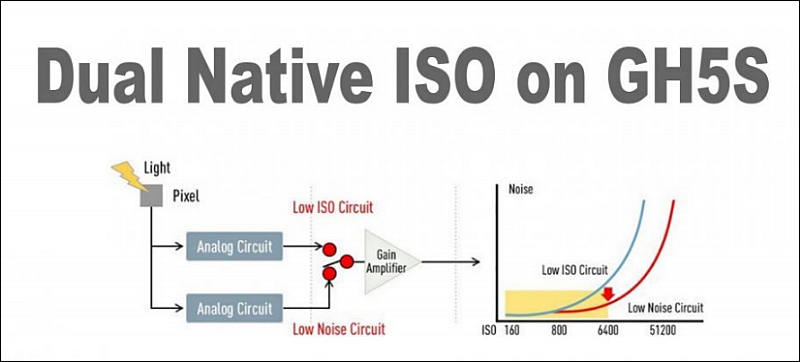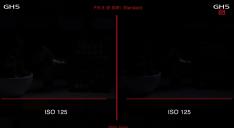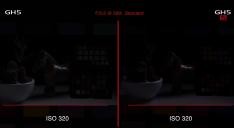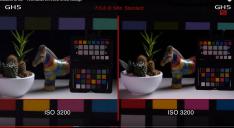
It allows to keep PV going, with more focus towards AI, but keeping be one of the few truly independent places.
-
GH5s High ISO Test - Compared to the A7s II, EVA1 & GH5:
-
No IBIS is a dealbreaker. Lowlight looks great though.
-
I don't see how wireless TC transmission is linked into this.
Neither do I think this is linked to Zaxcom, as the main issue people usually have with them is blocking simultaneously recording and wireless audio transmission (i.e. a bodypack that is both a recorder and a transmitter!).
Let's continue to this talk later, ok? As it seems you think about different things here.
-
GH5s photo ISO test: http://www.imaging-resource.com/PRODS/panasonic-gh5s/panasonic-gh5sA7.HTM
GH5s video tests and comparisons: http://www.imaging-resource.com/PRODS/panasonic-gh5s/panasonic-gh5sA.HTM#shooting1
"At both 12,800 and 25,600, the GH5S looks slightly better than the A7S II at the same ISOs, which is both unexpected and subjectively highly impressive for a camera featuring a sensor that is a fraction the size of the other.
A sensor significantly smaller than the full-frame A7S II is beating that camera in low-light performance. I never thought I would see the day. With these test results, it's hard to argue that the GH5S is not the new king of low light."
-

Marketing finally produced something about Dual ISO, looks fake.

 sa1319.jpg800 x 362 - 33K
sa1319.jpg800 x 362 - 33K -
Maybe there will be a "DRS" version in 2020. DRS = dynamic range +sensitivity, using the dual iso for better low light and also to improve dynamic range to get 14 fstops.
-
In 2020 we would see the GH6, not another GH5 iteration.
-
Maybe there will be a "DRS" version in 2020. DRS = dynamic range +sensitivity, using the dual iso for better low light and also to improve dynamic range to get 14 fstops.
Actually I asked Nick about their definition of DR.
One thing I like less and less is Panasonic marketing machine who takes you for imbecile.
-
hahahah vk that's too funny :)
-
Incredible and clean performance in low light.
Now I need sale my A6500, my GX8 and a kidney.
-
To my knowledge Panasonic engineering has never said that its better DR, simply much cleaner. And 400/1250/2500 are very impressive. 3200 and even 6400 pretty well useable.
-
To my knowledge Panasonic engineering has never said that its better DR, simply much cleaner. And 400/1250/2500 are very impressive. 3200 and even 6400 pretty well useable.
Words like "impressive" and "usable" are very similar to "analytical" and "slightly veiled".
So, what is the definition of DR in Panasonic sandbox?
-
After this image analysis, i have a conclusion.
The way the dual native ISO is implemented in this sensor, is intrinsically different from the Panasonic sensors. As i said before, they are using the native HDR implementation to make this fake dual native ISO. So the way they have implemented this, affects the dynamic range of the camera. You can see on the images the GH5 manages to implement better the DR from lower ISO, this means that you loose DR on GH5S on low ISO, and it begins to show its true potential on high ISO. More like what the Starvis sensor was make for.
I think we have a case here of bad handling of the luma information, via a bad implementation of the HDR circuity to make the DUAL ISO feature. This can be fixed via firmware.
Its the only thing i have noticed about this camera, and the highlights roll-offs are bad also.
Its a pity that the dynamic range was not incremented, cos this sensor has the capability of 14 stops.
Gh5 more solid iso management until 1600, Gh5s low light 4/3's beast. Bad in Low iso.

 Untitled-1.jpg1818 x 996 - 41K
Untitled-1.jpg1818 x 996 - 41K
 Untitled-2.jpg1818 x 996 - 51K
Untitled-2.jpg1818 x 996 - 51K
 Untitled-3.jpg1818 x 996 - 75K
Untitled-3.jpg1818 x 996 - 75K
 Untitled-4.jpg1818 x 996 - 128K
Untitled-4.jpg1818 x 996 - 128K
 Untitled-5.jpg1818 x 996 - 148K
Untitled-5.jpg1818 x 996 - 148K -
So correct me if im wrong but it does have 5 axis Stab.? and 21mp stills mode?
https://www.adorama.com/ipcdcgh5s.html
Thats what adorama is stating.
Key Features:
10.2MP high-sensitivity MOS sensor with multi-aspect and dual native ISOUnlimited in-camera recording of C4K4K Anamorphic professional video productionDual SD Card slots (UHS-II U3 CompatibleMicro Four Thirds Format10 MP, 21 MP4KBuilt-In Viewfinder5-Axis OpticalWi-Fi: YesBluetoothBody Only
-
Adorama also like to save on staff, hence they copy specs and forget to change some.
-
hmm, I dont care. even if it doesnt have ibis, I got a ronin so im covered there. the 10mp is what I want to see side by side with the gh5 20mp stills.
-
The image is sharper in Gh5S, from what I've seen. Multiple tests show a darker image on Gh5S, also it generates more contrasty scenes on lowlight, there is also a yellow tint on it, that clearly can't be taken away that easily. Can this be a direct influence of the different bayern pattern on the sensor?.... Maybe not. The slowmotion has little moire but for 240fps don't even care. Looks grate.
This camera is a very much mature video camera in almost all aspects. I don't miss ibis. I think it's nice, but you have accessories for it, so... It's OK. Not a dealer breaker. Whatever it takes to make a low noise high speed sensor.
About dynamic range I'm a little bit disappointed. The potential of making real HDR from sensor was massive. I think 12 stops would be sufficient not to compete with Eva1 and offer current gh5 buyers a not hate us credential to Panasonic's favor.
Its a little stupid not to use sensor true potential, but I think firmware for this use was clearly different from Panasonic perspective. I still believe much can be done with this sensor, but they won't do it. Please don't think I'm bragging about it. For me it's ok.
I think Gh6S will use 14 stop sensor.
-
The GH5s is an interesting beast. I have been a GH user since the GH2. For me, IBIS has been one of the greatest improvements in camera design. It is wonderful to be able to steady ANY lens, as I have also used Olympus cameras as well. To have that in a video camera, fits my handheld shooting style. I have had 2 videographers trade cameras and systems for this feature alone. One of my favorite lenses is the 40-150 f2.8 from Olympus which has no OIS. Now I use it all the time on the GH5, in fact I sold my Olympus EM1m2 and bought a second GH5.
I guess, we need to treat this new camera as a different camera, like the Sony A7S. Different cameras for different purposes. Least now we don't have to switch brands and get terrible batteries.
This new camera is more expensive for the right reasons though. Including V-Log is more professional. Included external TC support is more professional. The Multi-Aspect sensor is more professional. I do see this cameras as a perfect baby brother to the new EVA-1. They are more similar than different. But this GH5s comes from the consumer division.
In some ways you should treat the camera like the GH4, as it did not have IBIS either. It is more a specialized camera for me now, when i need long records with no battery change. Nothing beats the GH4 for that. I also use mine on a tripod or Gimbal. It becomes a third camera for me. I do have a lot of stabilized lenses as well.
The GH5 has improved the footage of some of the shooters I work with because of the IBIS. I can just hand them a GH5 and they will give me better footage.
Will the standard GH5 user by one? I would say maybe. If they have a need for it, it is a better choice to stay in the fold than to leave. If they can afford it because they want a second camera. I am not rushing out to buy one as I already have 2 GH5's.
-
Amazing camera for those who don't care about IBIS. Well dony Panny.
-
I've calculated the crop factors for each aspect ratio on the GH5s based on camera specs:
3680 pixel long in 4/3 = 2x crop factor in 4/3 still mode
3840 pixel long in 3/2 = 1,91x crop factor in 3/2 still mode
4016 pixel long in 16/9 = 1,832x crop factor in 16/9 still mode
4096 pixel long in 17/9 = 1.796x crop factor in 17/9 (DCI 4K) video mode
3840 pixel long in 3/2 = 1,91x crop factor in 16/9 4K UHD video mode.
35mm means 3680x3680 = 7360 pixel long or 1x crop factor
If you add a Speed Booster Ultra to the GH5s you get in DCI 4K a crop factor of 1,275x with 35mm lenses.
If you add a Speed Booster XL to the GH5s you get in DCI 4K a crop factor of 1,149x with 35mm lenses.
Howdy, Stranger!
It looks like you're new here. If you want to get involved, click one of these buttons!
Categories
- Topics List23,993
- Blog5,725
- General and News1,354
- Hacks and Patches1,153
- ↳ Top Settings33
- ↳ Beginners256
- ↳ Archives402
- ↳ Hacks News and Development56
- Cameras2,368
- ↳ Panasonic995
- ↳ Canon118
- ↳ Sony156
- ↳ Nikon96
- ↳ Pentax and Samsung70
- ↳ Olympus and Fujifilm102
- ↳ Compacts and Camcorders300
- ↳ Smartphones for video97
- ↳ Pro Video Cameras191
- ↳ BlackMagic and other raw cameras116
- Skill1,960
- ↳ Business and distribution66
- ↳ Preparation, scripts and legal38
- ↳ Art149
- ↳ Import, Convert, Exporting291
- ↳ Editors191
- ↳ Effects and stunts115
- ↳ Color grading197
- ↳ Sound and Music280
- ↳ Lighting96
- ↳ Software and storage tips266
- Gear5,420
- ↳ Filters, Adapters, Matte boxes344
- ↳ Lenses1,582
- ↳ Follow focus and gears93
- ↳ Sound499
- ↳ Lighting gear314
- ↳ Camera movement230
- ↳ Gimbals and copters302
- ↳ Rigs and related stuff273
- ↳ Power solutions83
- ↳ Monitors and viewfinders340
- ↳ Tripods and fluid heads139
- ↳ Storage286
- ↳ Computers and studio gear560
- ↳ VR and 3D248
- Showcase1,859
- Marketplace2,834
- Offtopic1,320













